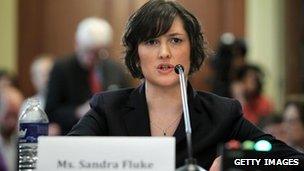Limbaugh apologises for calling law student a 'slut'
- Published

Rush Limbaugh admitted his choice of words was "not the best"
US radio host Rush Limbaugh has apologised for calling a law student a "slut" for her views on contraception.
In comments on his radio show earlier this week, Mr Limbaugh suggested Sandra Fluke's testimony to a US congressional committee made her "a prostitute".
In a statement released on his website, external, Mr Limbaugh apologised to Ms Fluke "for the insulting word choices" and said he "did not mean a personal attack".
On Friday, President Obama had called Ms Fluke to offer his support.
Mr Obama told Sandra Fluke he was disappointed she had been the subject of "unfortunate attacks", White House spokesman Jay Carney said.
She was initially blocked from testifying by House Republicans.
But Ms Fluke eventually testified on 23 February in support of Mr Obama's ruling that religiously affiliated institutions such as universities and hospitals should provide insurance plans that cover all costs for medicinal contraceptives.
In his apology Mr Limbaugh said that he was attempting to be "humorous" in expressing his opposition to the ruling.
"I think it is absolutely absurd that during these very serious political times, we are discussing personal sexual recreational activities before members of Congress," Mr Limbaugh said.
"If this is accepted as the norm, what will follow? Will we be debating if taxpayers should pay for new sneakers for all students that are interested in running to keep fit?" he asked.
"My choice of words was not the best," he admitted.
'Model of civil discourse'
Limbaugh's earlier comments about Ms Fluke caused widespread controversy.
"What does it say about the college co-ed Susan [sic] Fluke who goes before a congressional committee and essentially says that she must be paid to have sex," he said.
"It makes her a slut, right? It makes her a prostitute. She wants to be paid to have sex. She's having so much sex she can't afford the contraception. She wants you and me and the taxpayers to pay her to have sex."
After criticism of his initial remarks, Mr Limbaugh had at first refused to back down.
"If we are going to pay for your contraceptives, and thus pay for you to have sex, we want something for it. We want you post the videos online so we can all watch," he said on Thursday.

Sandra Fluke said President Obama told her that her parents "should be proud"
A third year law student at Georgetown University, Ms Fluke previously served as president of the university's Students for Reproductive Justice group.
Her testimony, externalincluded the case of a fellow student who needed birth control to control ovarian cysts.
Georgetown, a Catholic university with a prestigious law school, does not cover birth control to prevent pregnancy in its student health plan, and the student, who is gay, could not convince the insurance company she was ill.
Ms Fluke also asserted that birth control prescriptions could cost as much as $3,000 (£1893) without insurance.
Georgetown University President John DeGioia defended Ms Flukein a statement, external, calling her "a model of civil discourse" and branding Limbaugh's earlier remarks "misogynistic, vitriolic, and a misrepresentation of the position of our student".
Rule change
Catholic leaders have been angered by the new rule, which required church-linked institutions to offer health insurance including birth control while exempting houses of worship directly.
But the White House changed the scheme to allow health insurers to provide cover if employers objected.
"No woman's health should depend on who she is or where she works," President Obama said, announcing the policy change at the White House in February.
The adjustment to the policy would mean Americans would not have to choose between "religious liberty and basic fairness", he said.
- Published2 March 2012